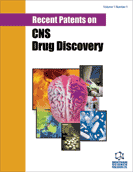Abstract
Obesity is considered one of the risk factors for metabolic disorders. There is increasing evidence that obesity is under control of several cytokines and hormone in the brain. Brain histamine and H3 receptors are important factors for regulating obesity. The results of physiological and pharmacological studies revealed that brain histamine and H3 receptors are involved in the regulation of obesity. In this review, we describe the implication and patent for developing H3 receptor antagonists and their therapeutic potential of obesity.
Keywords: Histamine, obesity, histamine H1 receptors, histamine H3 receptors
Recent Patents on CNS Drug Discovery (Discontinued)
Title: Therapeutic Approach of Histamine H3 Receptors in Obesity
Volume: 2 Issue: 3
Author(s): Takayuki Masaki and Hironobu Yoshimatsu
Affiliation:
Keywords: Histamine, obesity, histamine H1 receptors, histamine H3 receptors
Abstract: Obesity is considered one of the risk factors for metabolic disorders. There is increasing evidence that obesity is under control of several cytokines and hormone in the brain. Brain histamine and H3 receptors are important factors for regulating obesity. The results of physiological and pharmacological studies revealed that brain histamine and H3 receptors are involved in the regulation of obesity. In this review, we describe the implication and patent for developing H3 receptor antagonists and their therapeutic potential of obesity.
Export Options
About this article
Cite this article as:
Masaki Takayuki and Yoshimatsu Hironobu, Therapeutic Approach of Histamine H3 Receptors in Obesity, Recent Patents on CNS Drug Discovery (Discontinued) 2007; 2 (3) . https://dx.doi.org/10.2174/157488907782411792
| DOI https://dx.doi.org/10.2174/157488907782411792 |
Print ISSN 1574-8898 |
| Publisher Name Bentham Science Publisher |
Online ISSN 2212-3954 |
 5
5Related Articles
-
Influence of Lifestyle Measures on Hypertriglyceridaemia
Current Drug Targets Onset of Hypertension in Leflunamide Treated Low Socioeconomic Rheumatoid Arthritis Patients: An Unseen Iceberg
Current Rheumatology Reviews Subclinical Vitamin B12 Deficiency and Heart Rate Variability Across Life Cycle
Current Aging Science Morbidity and Mortality Associated with Pharmacotherapy. Evolution and Current Concept of Drug-Related Problems
Current Pharmaceutical Design Integrative Control of Gastrointestinal Motility by Nitric Oxide
Current Medicinal Chemistry Synthesis of Novel and Highly Functionalized Pyrimidine-5-carboxylate Derivatives and their Antimicrobial Evaluation
Letters in Drug Design & Discovery Abstracts from Speakers
Cardiovascular & Hematological Disorders-Drug Targets Diversity in Hypertension and Cardiovascular Disease Around the Globe
Current Hypertension Reviews The Challenges in Moving from Ageing to Successful Longevity
Current Vascular Pharmacology Genetics of Vesicoureteral Reflux
Current Genomics Small Molecule Complementarity As A Source of Novel Pharmaceutical Agents and Combination Therapies
Current Pharmaceutical Design The Role of Antiangiogenetic Agents in the Treatment of Breast Cancer
Current Medicinal Chemistry Limonin, A Citrus Limonoid, had no Apparent Effect on Cognitive Dysfunction in Mice with Chronic Cerebral Hypoperfusion
Immunology, Endocrine & Metabolic Agents in Medicinal Chemistry (Discontinued) Correlation between Decreased Parasympathetic Activity and Reduced Cerebrovascular Reactivity in Patients with Lacunar Infarct
Current Neurovascular Research Ligand-receptor Engineering and its Application Towards the Complementation of Genetic Disease and Target Identification
Current Topics in Medicinal Chemistry Screening of Enzyme Inhibitors from Traditional Chinese Medicine
Combinatorial Chemistry & High Throughput Screening Structure and Function of Myelinated Nerve Fibers in the Rabbit Eye Following Ischemia/Reperfusion Injury
Current Neurovascular Research The Relevance of Supplemental Vitamin D in Malignancies
Anti-Cancer Agents in Medicinal Chemistry Stenting Renal Artery Stenosis: What is the Fuss All About?
Reviews on Recent Clinical Trials Mechanisms and Medical Management of Exercise Intolerance in Hypertrophic Cardiomyopathy
Current Pharmaceutical Design






















